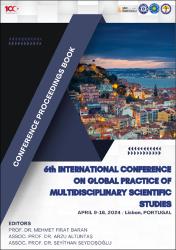Fibromiyalji sendromunda güncel tedavi yaklaşımları
Citation
Ökcü, Ö.; Tanşu, A.; Yavuz Akçay, Y. Fibromiyalji sendromunda güncel tedavi yaklaşımları. 6th International Conference on Global Practice of Multidisciplinary Scientific Studies (2024), 19-20.Abstract
Fibromiyalji sendromu (FMS), klinik olarak kas-iskelet sistemi ağrısı, kas gücü ve
enduransında azalma, genel kondisyon kaybı, eklem hareket açıklığı kaybı, yumuşak doku
hassasiyeti, sertlik, genel yorgunluk ve uyku bozuklukları ile karakterize, yaygın kronik,
idiyopatik bir durumdur. Etiyoloji ve patogenezi iyi bilinmemekle birlikte FMS’nin oksidatif
stres, mitokondriyal fonksiyon bozukluğu, multivitamin eksiklikleri ve oksidanlar/
antioksidanlar arasındaki orantısızlığın bu sendroma sebep olduğu düşünülmektedir. Hastalık
başlangıç ve devamı, hastalığın seyrini ve yaşam kalitesini olumsuz yönde etkileyen
genetik/biyolojik ve psikososyal faktörler ile yakından ilişkilidir. Ayrıca FMS, kronik
yorgunluk sendromu, irritabl bağırsak sendromu, fonksiyonel dispepsi, miyojenik
temporomandibular bozukluk, gerilim baş ağrısı, miyofasiyal ağrı sendromu, huzursuz bacak
sendromu, interstisyel sistit, mesane ağrısı sendromu, travma sonrası stres bozukluğu ile de
ilişkili olan karmaşık bir sendromdur. Hastalık tanısına ilişkin herhangi bir objektif test veya
biyobelirteç tanımlanmamış olmakla birlikte bu hastalarda tek başına farmakolojik tedavi
yetersizdir. Ağrıya neden olan farklı mekanizmalar göz önüne alındığında, kronik ağrının
periferik, merkezi, bilişsel-duygusal ve kişilerarası nedenlerini hedef alan multidisipliner
programlar ile tedavi edilmesi uygun olmaktadır. Bu popülasyondaki duygusal semptomların
tedavi edilmesi ile, bilişsel durumdaki bozulma devam etse bile, dikkat süreçlerindeki
iyileşmenin artacağı gösterilmiştir. FMS’li hastalarda aerobik ve dirençli egzersizler,
elektroterapi yöntemleri, hidroterapi, balneoterapi, manipülasyon, kayropraktik yöntemler,
biofeedback, hipnoz, duyusal tedaviler, magnetoterapi, masaj, bilişsel davranışçı terapi,
farmakolojik ajanlar, akupunktur, zihin beden tedavileri, hiper barik oksijen tedavisi, optik sinir
stimülasyonu, lidokain infüzyonu, melatonin, koenzim Q10, D ve E vitaminleri takviyesi ile
palmitoiletanolamid uygulanması gibi çok çeşitli tedavi yaklaşımları hastalık semptomlarında
iyileşmeye neden olacağı bilinmektedir. Bu bağlamda FMS’nin tedavisinde multidisipliner bir
bakış açısıyla interdisipliner bir yaklaşım hastalık semptomları azaltmakta etkili olacaktır. Fibromyalgia syndrome (FMS) is a common chronic, idiopathic condition clinically
characterized by musculoskeletal pain, decreased muscle strength and endurance, general
deconditioning, loss of joint range of motion, soft tissue tenderness, stiffness, general fatigue
and sleep disorders. Although the etiology and pathogenesis of FMS are not well known,
oxidative stress, mitochondrial dysfunction, multivitamin deficiencies and disproportion
between oxidants / antioxidants are thought to cause this syndrome. The onset and continuation
of the disease are closely related to genetic/biological and psychosocial factors that negatively
affect the course of the disease and quality of life. In addition, FMS, chronic fatigue syndrome,
irritable bowel syndrome, functional dyspepsia, myogenic temporomandibular disorder,
tension headache, myofascial pain syndrome, irritable It is a complex syndrome that is also
associated with leg syndrome, interstitial cystitis, bladder pain syndrome, and post-traumatic
stress disorder. Although no objective test or biomarker has been defined for the diagnosis of
the disease, pharmacological treatment alone is inadequate in these patients. Considering the
different mechanisms that cause pain, it is appropriate to treat chronic pain with
multidisciplinary programs targeting peripheral, central, cognitive-emotional and interpersonal
causes. It has been shown that by treating emotional symptoms in this population, improvement
in attentional processes will increase, even if impairment in cognitive status persists. In patients
with FMS, aerobic and resistant exercises, electrotherapy methods, hydrotherapy,
balneotherapy, manipulation, chiropractic methods, biofeedback, hypnosis, sensory treatments,
magnetotherapy, massage, cognitive behavioral therapy, pharmacological agents, acupuncture,
mind-body treatments, hyperbaric oxygen therapy, It is known that a wide variety of treatment
approaches, such as optic nerve stimulation, lidocaine infusion, melatonin, coenzyme Q10,
vitamins D and E supplementation, and administration of palmitoylethanolamide, will lead to
improvement in disease symptoms. In this context, an interdisciplinary approach from a
multidisciplinary perspective in the treatment of FMS will be effective in reducing disease
symptoms.
Source
6th International Conference on Global Practice of Multidisciplinary Scientific StudiesURI
https://zenodo.org/records/11211705https://doi.org/10.5281/zenodo.11211705
https://hdl.handle.net/20.500.12780/861


















